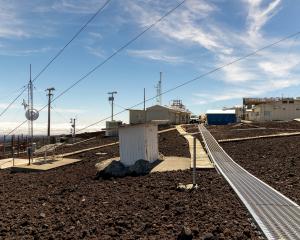Quantity surveyor Alan Hoffman earned about $NZ230,000 working in mine construction in Western Australia last year.
His healthy bank balance has allowed him to fly his partner's parents around Australia as a Christmas present and indulge his love of sport by attending the Australian Tennis Open and the Formula 1 Australian Grand Prix.
He also has two investment properties back in New Zealand.
After nine years working for a quantity surveying firm in Dunedin, Hoffman moved to Perth 14 months ago, attracted by money, lifestyle and school friends already living there.
The former Otago Boys' High School pupil had always planned to end up across the Tasman and describes the transition as simple.
His employer paid his first four weeks' accommodation and lent him a car so he could find a place to rent. He set up a bank account before leaving and organised his tax number online.
Hoffman spends at least 80% of his time at mines in remote parts of Western Australia, where the principles of his job are the same as if he were still in Dunedin but conditions are vastly different.
The Argyle mine he worked at produces rare pink diamonds, while the Karara iron ore mine cost $A4 billion($NZ4.6 billion) to build, employed more than 2500 people at the height of construction and took only 24 months to complete.
As a quantity surveyor and contract administrator, he works an average of 60 hours a week and paid $NZ75,000 tax last year, which was more than his entire New Zealand salary.
Although he does not rule out returning to New Zealand to have a family, he says that with a Danish partner, he is more likely to settle in Europe.
Fortunately, he is based in an air-conditioned office and can choose when to go out, he says, adding that he works 11 days in a row and then has three days off.
''You obviously can't escape your working environment because you're so isolated. But the body adapts to long hours and everyone on site is in the same boat. They realise that after a day's work, people need their own space.''
Like most mines, Karara has gymnasiums, tennis courts, a swimming pool, a bar and a runway. The airstrip services eight return flights a day, each carrying about 50 people.
The slowing Australian economy has not made him consider a return to New Zealand, he says.
His employer has 80 branches in 33 countries and rather than lose staff, would prefer to transfer them to a different office where there is work.
Besides, there are $A50 billion to $A60 billion ($NZ57-$NZ69billion) worth of projects on the go in Western Australia and that means the construction industry should stay afloat for a few years yet.
New Zealanders could also benefit if the Australian Government limits the special skills visas it issues to migrants from other countries, he believes. Kiwis do not need the visa to work in Australia so are less costly in time and money to hire than other nationalities.
The cost of living in Perth is ''high''.
A pint of beer costs $A13 to $A15 ($NZ15-$NZ17.30), stamp duty is added to the advertised prices of houses and cars, and many people offer more than the asking price just to secure rental accommodation.
His small one-bedroom apartment costs $A340 ($NZ393) a week and friends rent a two-bedroom apartment for $A1100 ($NZ1271).
He also misses the convenience of travelling to a lake or the mountains for a weekend. It's one of the world's most isolated cities and ''nothing is close''.
However, the weather ''cannot be faulted'' and many workers have moved there from other places so were out to make new friends.
Nor is he concerned that New Zealanders without permanent residency are excluded from many social security payments.
''It makes sense. No country wants foreigners to milk their system. I'm currently looking into becoming a permanent resident, which my company will have to sponsor me for. Kiwis are considered only temporary residents.''
Friends who have moved to Australia without jobs have seen their money quickly dry up so it is best to organise work first, he says. But his only other advice is to ''give it a go''.
''If things don't work out, home is generally only three to four hours away; seven if you're in Perth.''












